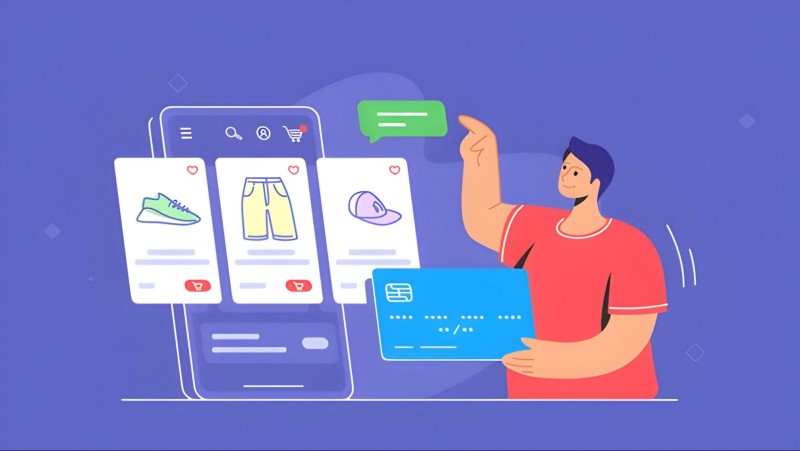Running a product-based business without an online presence is difficult in today's competitive market. Imagine if clients are having trouble finding your wonderful goods. If your eCommerce app isn't developed properly, your clients will suffer online. As a result, people cannot easily browse, navigate or make transactions. This dissatisfaction leads to lost sales opportunities, decreased client loyalty, and a reduced brand presence. Additionally, clients may go for rival websites to get a more user-friendly and entertaining online experience.
eCommerce app development can be your digital ocean compass for beating your competition, increasing sales, and making your company successful. It is essential to have a smooth user-focused interface for a better online purchasing experience for your users.
The Rise of eCommerce
eCommerce has shown an incredible growth rate in recent years. It is due to the growing internet usage, the ease of online shopping and technological developments. Data shows that there has been a notable increase in online sales, as mostly customers prefer online marketplaces.
The e-commerce sector is expanding rapidly, there will be 427 million active online shoppers worldwide by 2027. This industry is expected to be valued more than 350 billion US dollars by 2030.
This change is made by the ease of home delivery, 24/7 shopping accessibility and product/price comparison. Furthermore, the increase of mobile devices has made online purchasing more accessible than in the past, hence promoting the eCommerce industry's growth.
Role of Application Development in E-commerce

Smooth and responsive eCommerce applications are essential for success. Providing a good user experience is essential for keeping clients. A pleasant shopping experience provides intuitive navigation, clear product information and a quick interface. E-commerce companies can enhance overall growth, increase conversions and improve customer happiness by prioritizing timeliness and user-friendliness.
Mobile applications provide customers a simple and personalized way to purchase, transforming the online shopping experience. Provides features like push alerts, product recommendations and easy checkout procedures. Mobile applications allow companies to provide exclusive discounts, loyalty programs and interactive experiences. It increases customer engagement and loyalty. The incorporation of augmented reality and virtual reality technology into smartphone apps has improved the shopping experience for users.
Advantages of Application Development for Online Retailers
Application development provides a number of advantages for online retailers:
Better Convenience
Customers may use their fingertips to shop anywhere anytime with the help of an eCommerce app. They can increase convenience and break down the barriers of a physical business with the use of an app.
Greater Scope
Companies who do not have a physical presence in several regions can nonetheless reach a global audience. E-commerce businesses can investigate new markets as well.
Availability Round the Clock
eCommerce stores are designed to operate around the clock, in contrast to physical stores, and a feature-rich, intuitive app can help achieve this goal.
Individualized Method
Personalized shopping experiences are the goal of e-commerce apps, which use user data to their advantage. It is able to provide customized promotions and product recommendations.
Effective Administration
Warehouse management that is effective can be ensured by real-time inventory tracking and insights. Online retailers are able to manage their inventory effectively.
Case Studies of Successful E-commerce Apps
Here are a few instances of e-commerce businesses that have used application development to great effect:
Amazon: Its mobile app offers capabilities like one-click ordering, barcode scanning, and customized suggestions. Amazon has experienced significant growth.
Walmart: Walmart's app has become a famous destination for shoppers with features like in-store pickup, grocery delivery and augmented reality experiences.
eBay: eBay's app provides social sharing, price tracking and image search to improve user experience.
Etsy: The Etsy app makes it easier to find and buy goods by highlighting distinctive and handcrafted goods.
Sephora: Its features include individualized product suggestions, beauty tutorials and virtual makeup try-ons.
Challenges and Considerations
Typical difficulties and obstacles in e-commerce mobile app development:
Ignoring User Experience: An app that puts functionalities before user experience may be unsatisfactory and inefficient.
Inadequate Testing: The app's reputation may suffer if there are bugs, crashes or poor performance.
Security Vulnerabilities: Fraud and data breaches can occur when security precautions are neglected.
Limited Integration: The app's functionality may be hampered by a difficult time integrating it with current systems, such as customer relationship management, inventory management and payment gateways.
Performance Problems: Poor performance, frequent crashes and slow loading times can irritate and alienate users.
Limited Scalability: System failures and unhappy customers may result from an inability to manage expansion and increased traffic.
Careful planning, extensive testing, and an emphasis on user-centric design and development are necessary to meet these hurdles.
eCommerce appears to have a bright future, but there are obstacles to be addressed. Crucial factors to take into account include making sure users have a flawless experience, taking care of security issues, and keeping up with quickly changing technologies. But there are a ton of chances for e-commerce to develop and innovate. Retailers may generate business success, foster consumer loyalty, and offer unique shopping experiences by utilizing application development.
The Future of E-commerce Application Development

Exciting opportunities are coming for eCommerce application development in the near future. We may anticipate seeing further integration of virtual reality, augmented reality, and artificial intelligence in online shopping experiences. Voice-activated purchasing, tailored suggestions, and smooth cross-channel interactions will gain increased traction. Furthermore, improvements in blockchain technology will improve e-commerce transaction security and transparency. These developments will completely change how people shop and open up new avenues for customer interaction for companies.
Conclusion
Application development will have a significant influence on how e-commerce develops in the future. We should anticipate increasingly more advanced and customized purchasing experiences as technology develops. Retailers can grow in the cutthroat world of internet retail by adopting innovations in eCommerce application development.
